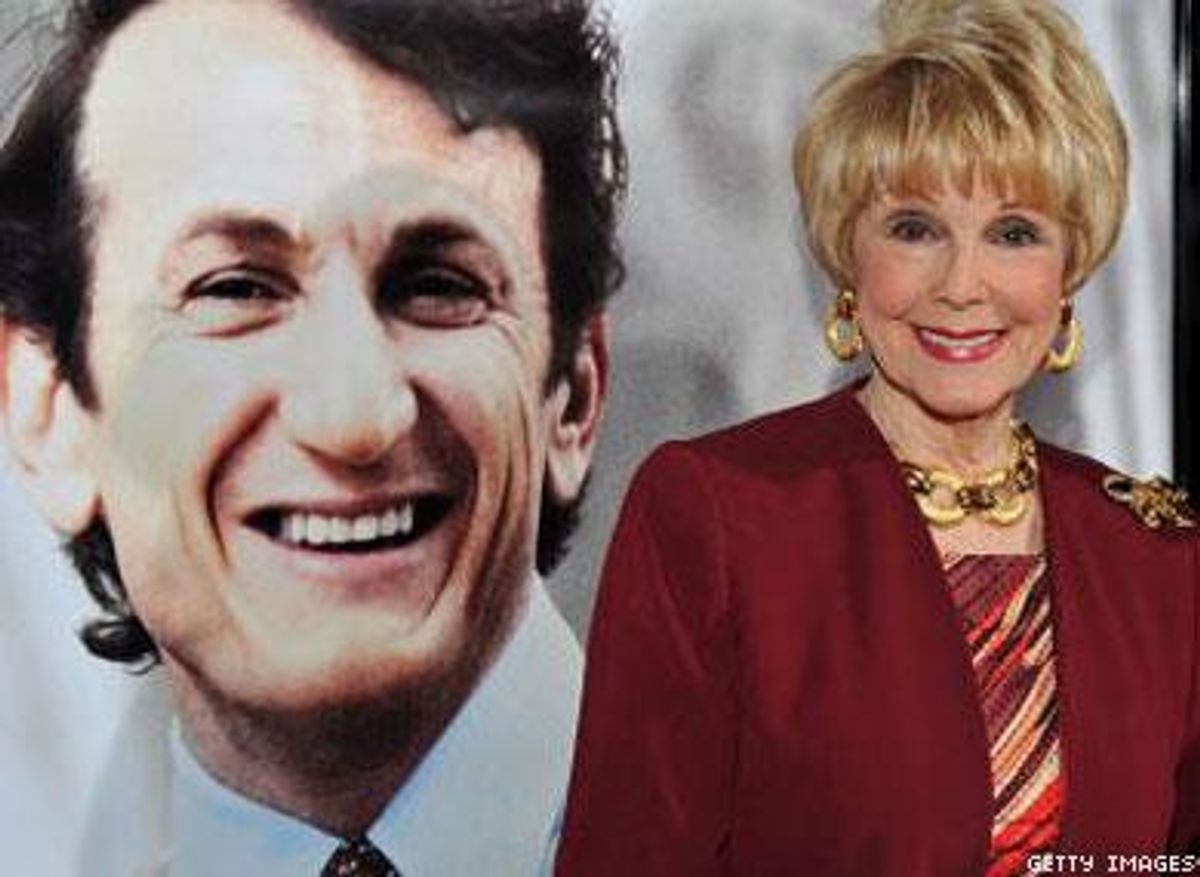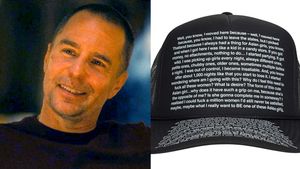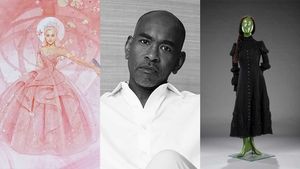Stanley Kramer was the renowned director and producer of such great films as Guess Who's Coming to Dinner, Judgment at Nuremberg, It's a Mad, Mad, Mad, Mad World, and Inherit the Wind. He was also a great instigator of social change and a champion for social consciousness.
Stanley passed away in 2001, and his widow, Karen Kramer, a woman of equally formidable intelligence and heart, keeps his legacy alive by each year choosing the film to receive the Stanley Kramer Award of the Producers Guild of America. The qualities she looks for are simple -- the recipient should be a film that embodies the strength, compassion and social awareness that is Stanley's legacy.
This year Karen Kramer has chosen Milk, the biopic about the late gay San Francisco city supervisor Harvey Milk. In this very busy awards season, Karen sat down with Advocate.com to talk about Milk and why selecting the film to receive the Stanley Kramer Award was something of a no-brainer.
Advocate.com:Tell me about the Stanley Kramer Award and why it's so important.Karen Kramer: I started the Stanley Kramer Award in 2000 to celebrate films that promote social consciousness. In the first year there really was no one to give it to. It's an area of film that needs to be highlighted, but it's not always an easy job to find any that fit into that category. Everything is so depressing these days. None of the big films out right now are very uplifting. It's a sign of the times -- a reflection of what's going on. Maybe if we made more films with a conscience and a happy ending more people would be happy.
Why did you choose Milk to receive this award this year?Milk was the obvious choice for me. It was my choice for the award even from just seeing the documentary [The Times of Harvey Milk]. Of course, I saw all the other films this year, but nothing was as worthy as Milk.
Why is this film so powerful?Milk dealt with Prop. 6 [a ballot measure that sought to bar gay people from teaching in California schools], but essentially it was talking about Prop. 8 [the state's anti-gay-marriage initiative]. It epitomizes Stanley's dedication to change. Stanley fought for civil rights starting all the way back in 1947, and he would have definitely fought for gay rights. This is a film Stanley would have made. Milk needs to get recognized because of Prop. 8. The vote didn't turn out the way we wanted. It needs awards and it needs to be talked about -- now more than ever.
Why do you think the vote didn't turn out the way we wanted? I think people were confused by the wording. I think the whole thing was designed to confuse and separate people.
Do you think that was intentional? Possibly. We always have problems when Republicans are in office. It's their way.
I've heard that you liken Milk to Stanley Kramer's very controversial and socially altering Guess Who's Coming to Dinner. Oh yes. When Guess Who's Coming to Dinner was made, interracial marriage was still illegal in 16 states. No one wanted to make that film. People were scared of it. Our lives were threatened [because of it]. But we knew it had to be made. It was the issue of our times, and I truly believe that it helped soften the blow that Americans were feeling around interracial marriage. Fortunately, by the time it was released, [a U.S. Supreme Court decision had come down] legalizing interracial marriage in all the states. Still the studio tried to hide it. We only opened in one little theater in Westwood. But you know what? When it opened, there was a line 15 blocks long just to get into that one theater. People wanted to see it. They needed to see it. You have to fight for change. It doesn't come easy. People are resistant to change. But I'm a fighter. I'm a Kramer. That's what we do. I stand up because if you don't, things happen that you don't want to happen. I couldn't be married to Stanley for 35 years if I wasn't like that.
Did you run into opposition when you chose Milk for the award? Yes, but I never wavered. People have told me for years, "I'll do your next film if you give me the award," but I can't be bought. The film has to be worthy. You know, Stanley was the first person to break the blacklist. In 1957 he made The Defiant Ones and hired two blacklist writers and used their real names. At the time the poor blacklisted writers were working under aliases for practically nothing, but Stanley paid those two more money than anybody had been paid in 17 years. He put them in an office right next to him. He even hired them as actors. And when the credits rolled, he put their names right under their faces as if to say "not on my watch, you don't." That's the kind of man he was, and that's the kind of spirit this award has to carry.
Do you think Milk has that kind of influence? Absolutely. I wouldn't have picked it if it hadn't. When people saw Guess Who's Coming to Dinner, it affected them -- it changed their minds about the things they were thinking. I pray that Milk has the same power. I'm working hard to make it so. We release the name of the award winner very early because we want to create a buzz. We want to bring awareness to not only a great movie, but a great cause as well.
You have a great enthusiasm for what you do. In this business there is no sure deal. We do it because we're hooked on it. We're all masochistic. Anyone will tell you that if you can do something else you should. In showbiz, most of the time you're unemployed. The rest of the time you're either trying to get money to make something or you're defending what you've already made. I'm not in this to make money. I want to know that when it's all over, I've made some change -- change in the world. What good is doing something just for yourself? It's got to effect change in the world.
Do you think Stanley would be proud of Milk and the changes it's bringing about? The quote that best describes Stanley comes from his movie Judgment at Nuremberg. One of the judges says, "This is what we stand for: justice, truth, and the value of a single human being." That sums him up.
Sounds like something Harvey Milk would have said. That it does. That it does.

















































































